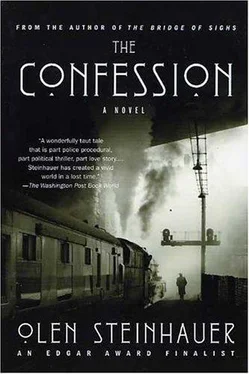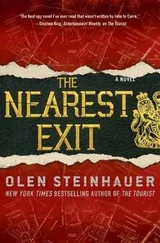Olen Steinhauer - The confession
Здесь есть возможность читать онлайн «Olen Steinhauer - The confession» весь текст электронной книги совершенно бесплатно (целиком полную версию без сокращений). В некоторых случаях можно слушать аудио, скачать через торрент в формате fb2 и присутствует краткое содержание. Жанр: Политический детектив, на английском языке. Описание произведения, (предисловие) а так же отзывы посетителей доступны на портале библиотеки ЛибКат.
- Название:The confession
- Автор:
- Жанр:
- Год:неизвестен
- ISBN:нет данных
- Рейтинг книги:5 / 5. Голосов: 1
-
Избранное:Добавить в избранное
- Отзывы:
-
Ваша оценка:
- 100
- 1
- 2
- 3
- 4
- 5
The confession: краткое содержание, описание и аннотация
Предлагаем к чтению аннотацию, описание, краткое содержание или предисловие (зависит от того, что написал сам автор книги «The confession»). Если вы не нашли необходимую информацию о книге — напишите в комментариях, мы постараемся отыскать её.
The confession — читать онлайн бесплатно полную книгу (весь текст) целиком
Ниже представлен текст книги, разбитый по страницам. Система сохранения места последней прочитанной страницы, позволяет с удобством читать онлайн бесплатно книгу «The confession», без необходимости каждый раз заново искать на чём Вы остановились. Поставьте закладку, и сможете в любой момент перейти на страницу, на которой закончили чтение.
Интервал:
Закладка:
“We’ve come to ask questions.” Stefan unfolded his green certificate to display the Militia hawk.
I stepped up to the bar. “One of your customers.”
The man flinched, just slightly. My size does that to people sometimes.
“Josef Maneck,” said Stefan. He climbed up on a stool and settled in for a long talk.
Cafe-bar #103’s portrait of Mihai, suspiciously sandwiched between vodka bottles, was blackened by years of smoke. The bartender squeezed a dirty rag, and a few drops fell on the counter. Then he set it down and soaked them up. He looked at me. “Don’t know any Josef Maneck.”
“Sure you do,” said Stefan. “About my height. But thin, very thin. A drunk.”
“Oh,” said the bartender, smiling, still looking only at me. “A drunk. That guy.”
“This drunk’s dead,” I told him.
His smile went away, and he stepped back, holding the rag in both hands. “What did you say his name was?”
“Josef Maneck,” said Stefan.
The bartender took off his glasses. He put them back on. “Maybe.” When I leaned against the bar, he finally looked at Stefan. “Maybe I know him. Did he have a way of blinking? You know.” He blinked a few times to demonstrate.
“When we saw him his eyes were shut,” said Stefan.
He looked at me again, as if I’d confirm it. Then he peered past us at the dark corner. “Hey, Martin! Martin!”
One of the two figures shifted a little, the head rose, then swung slowly toward us.
“Martin, is your friend dead? The one with the blink.”
I could just make out his features in the darkness-pink eyelids, wide mouth, high cheekbones. His face sat still a moment, then his lips parted. “Josef?” His voice was like gravel in a ditch.
“That’s the one, Martin,” said Stefan. He walked over. The second drunk, deeper in the blackness, didn’t budge. “Did you know he’s dead?”
“Josef?” Martin repeated.
I kept an eye on the bartender.
“Come on, Martin.” Stefan stood over him now, his wide gut level with the man’s face. “Why don’t you tell us about your friend.”
“He was crazy,” the bartender whispered.
I turned to him. “How’s that?”
“That man was trouble.” He picked up his rag again. “Started fights all the time. Isn’t that right, Martin?”
Martin, by Stefan’s belly, closed his pink eyes and considered it.
“Did he start fights, Martin?” asked Stefan. “Is that what your friend did?”
There were pumpkinseeds in a dish on the counter, and I collected some in my hand. “Was he a good fighter?” I asked the bartender. “Did he win his fights?”
“That nut?” He shook his head. “Never. He was crazy. He’d start a fight, then get brutalized. Every time.”
Stefan’s voice: “What do you say, Martin? Could you have beaten him up?”
“He was a nut, all right.” The bartender adjusted his glasses and looked at me. “So how’d he die?”
“Come on, Martin. It’s your friend we’re talking about! Give us some help.”
I chewed on a pumpkinseed, but it was soggy, so I spit it out in my hand and dumped it back into the dish. I had heard enough, and the familiarity of this place disturbed me. It was all so obvious; there was no reason to be here. Josef Maneck was a drunk who had reached the end of his tether. He got into a fight and lost, like every other time. He stumbled back to his apartment and, faced with the reality of where his life had brought him, decided to finally end it. He turned on the gas and sat on the kitchen floor. I had seen enough of his kind to know it was the inevitable end.
Stefan was squatting beside the drunk, a hand on his frayed jacket, shaking to keep him awake. “Come on, Martin. You can do it. Tell me about your friend.”
I scratched a mosquito bite on the back of my hand.
“Martin, tell me, did you kill your friend? Is that what happened? You can tell old Stefan.”
“I’ll be in the car,” I said, but didn’t know if he heard me. As I left, the bartender washed out the dish where I’d dumped my chewed seed.
9
He was in there a while longer, but on the drive back only said that there wasn’t anything to be learned from an alcoholic like that. We were in agreement.
Leonek had finally arrived at the station. He and Emil and Chief Moska were over by Brano’s desk. That in itself was strange; no one spent time with Brano Sev. But through them we saw a tall man with a thin mustache leaning back against the desk, his long legs crossed at the ankle. His top half was animated, arms moving around in his well-tailored jacket, smiling, speaking in heavy, grinding syllables. He had a horrendous Russian accent.
Chief Moska, though, looked as weary as ever. I’d watched him aging since I joined the police force during the German Occupation, back when his particular bureaucratic genius found a way to hide Stefan’s and my war records; he saved us. And then, when the Russians marched in and we were renamed the People’s Militia, his hair went gray overnight. He waved us over. “Meet Mikhail, guys.”
The Russian stood up to shake our hands. He did it somewhat stiffly, but winked at me as he gripped my fingers. He didn’t wink at Stefan, and I’m still not sure why.
“Mikhail Kaminski,” he told us both.
“From Moscow,” said Moska, and I think we all noticed then, if we hadn’t before, the similarity between our chief’s name and that capital. He seemed almost apologetic about it, his self-conscious smile revealing his two missing teeth on the left side. “Mikhail’s here for consultations.”
Brano Sev sat at his desk as passively as usual. Mikhail Kaminski was here to consult with Sev, no one else, but from that blank expression you couldn’t guess it.
“All consultation means is a lot of dull paper-pushing,” said Kaminski, smiling broadly to show us he wasn’t about to start doing any of that foolishness. “Where’s the closest bar?”
We all stared at his attempted joke.
“Seriously, though, I want everyone to feel free to approach me at any time. I’m from Moscow, you know, not the Moon.”
This Muscovite wasn’t from the Moon, but he was from Lubyanka. Even without his uniform, his KGB stripes were visible to all of us.
“Come on, guys,” Moska said, knowing when to step in and clear things up, “we’ve all got a lot of work to do.”
At his desk, Stefan and I looked over the coroner’s report. A simple suicide was, in the end, only that, and I tried to explain this to him. “But why now?” he asked. “Why does a man commit suicide now of all times?”
“Because it builds up. You don’t know how it can build up in a man. None of us does.”
He laid his chubby hands on the desk, spread wide. “But look around. Things haven’t been this good for a long time. The market’s fuller than ever before, political prisoners are coming back home, and you can read damn near anything you want. Why now? ”
I slouched deeper into my chair. “Tell me about him, then. What was he before he became a drunk?”
Stefan moved some pages until he came to a typewritten sheet. “Josef Maneck, born 1905 in Miskolc. His family ended up in the Capital in ’twenty-five, when his father opened a frame maker’s shop. The father died in ’forty-three, during the Occupation, and Josef took over his shop. He ran it for four years until, presumably because of connections, he became acting curator of the Museum of National Contemporary Art. In 1953 he was transferred to the Stryy Mineral Springs bottling plant outside town.”
“A bottling plant?”
“I suppose he wasn’t so good with the Culture Ministry. But he was no better on the assembly line. He was fired last year, for not showing up enough.”
Читать дальшеИнтервал:
Закладка:
Похожие книги на «The confession»
Представляем Вашему вниманию похожие книги на «The confession» списком для выбора. Мы отобрали схожую по названию и смыслу литературу в надежде предоставить читателям больше вариантов отыскать новые, интересные, ещё непрочитанные произведения.
Обсуждение, отзывы о книге «The confession» и просто собственные мнения читателей. Оставьте ваши комментарии, напишите, что Вы думаете о произведении, его смысле или главных героях. Укажите что конкретно понравилось, а что нет, и почему Вы так считаете.












